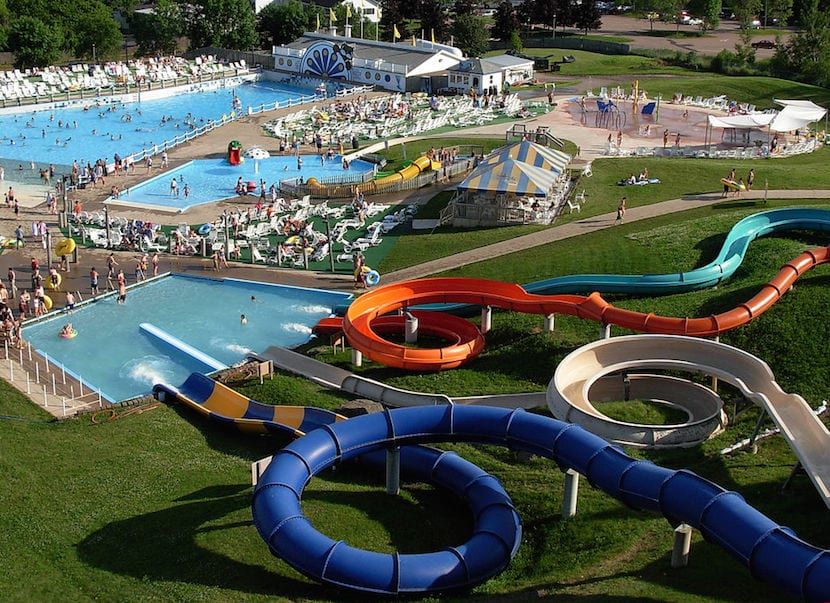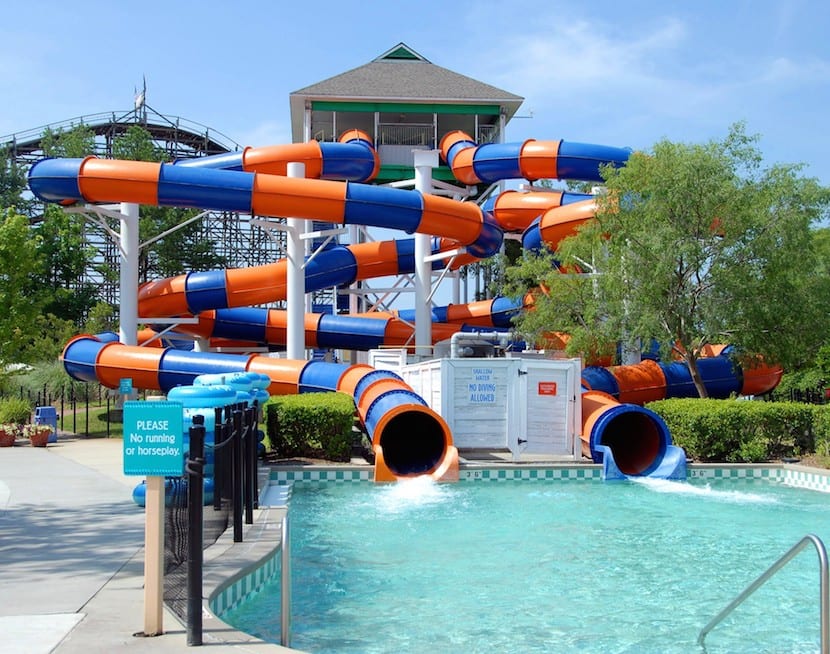
After several days of expected rains (although insufficient), the heat has made its appearance with temperatures that some days seem to be early summer, and not mid-spring. That is why we advised a few days ago that be careful if you go to the beach, or when the municipal swimming pools open soon, because a mistake could have a fatal outcome. In fact, 27 seconds are enough for a child to suffer from drowning by submersion or immersion in water.
And what about water parks? As soon as the school calendar ends, families and groups will begin to fill up, eager for a fun and “soaking” day. In addition to remembering that sun protection is necessary In these cases of continuous exposure, we would like to analyze all aspects related to safety in these facilities. Security that not only depends on the parks themselves, but on the use that users make of them.
We associate drowning with lakes, beaches, rivers and swimming pools; but accidents that could have been prevented can also happen in these parks. Let us keep in mind the very definition of an accident (according to the WHO) as “an eventual, anomalous and involuntary event, which results in physical or mental damage, AS a consequence of a lack of prevention or security defect.
I remember very well two of the last terrible events that occurred when the victim had gone to enjoy a day of fun with classmates or camp: in one of them it was a girl between 10 and 12 years old (I do not remember well) that He died while playing 'drown'.

The security that these parks offer.
A document from the Community of Madrid establishes all the legal requirements that the facilities, services and care or surveillance systems must meet. For example, posters should be available at each attraction that specify characteristics and instructions; and the lifeguards must be properly trained and uniformed. On the other hand, the non-slip pavement is mentioned, or the rescue elements, etc.
It is further stated that "The park may not allow access to children under 12 years of age who are not accompanied by an adult responsible for their custody" (Wow, it surprises me because at 12 and 13 they are still young to take depending on what risks in these contexts). However, the section Aqua Brava parks website security, clearly indicates that "minors may only enter accompanied by an adult", in this case I understand that for people over 15 or 16 perhaps the rule is more permissive.

Children and adults jumping down water slides, and feeling safe.
Possible thanks to a series of characteristics that the facilities have, complying with the corresponding regional regulations. Exist:
- General security measures, such as emergency plans or the supply of electricity to supply water.
- Specific security measures, which are related to the specific activity of the water park. For example, they are considered within this section support elements for lifeguards (rescue boats); or the passive elements that inform users, or separate the characteristics of each attraction (depth marks or corks are included).
We will also find adequate communication systems.

Child Safety in the aquatic environment: shared responsibility.
Taking into account the aspects discussed above, it is clear that water parks must provide the conditions for the stay to be safe (and it is). Which includes, according to Emergències Setmil, the evacuation measures of the park, and the provision of lifeguards, guards, medical personnel and monitors. But as I have commented, security also depends on each one of us.
For example, we should oblige ourselves to observe and comply with the rules of the games, strictly following the instructions of the lifeguards. And for the little ones to become aware of prevention, we can accustom them to reading the posters, and to ask questions when they do not understand any recommendation.. And when I say comply with the rules, I am also thinking about the minimum height required: if a girl or a boy does not measure the necessary centimeters to use an attraction, then they do not use it, and that's it!
It is also not allowed to dive headfirst into the pools; nor run, bother or push other bathers. If your children still cannot swim, you will have to resort to flotation systems (here you have more information) or stay with them at the edge of one of those family recreational pools.

Image taken from Emergències Set Mil
Summer is to enjoy but putting common sense and safety firstOnly then are experiences really fun.
Images - Second: I Stu_pendousmat, Third: VisitCentralFL
For when a Law that requires fences and access doors to any private, community, municipal water area, etc. so that minor children cannot access without supervision.
As in other countries that do take this issue seriously, an example of France with a law that obliges everyone, everyone.
Not like in Spain that until there is no aogamiento they do not put anything. And I say nothing because they comply with the standards, but they are not Active Safety. Because the one that has to have one or two lifeguards, there are only 4 eyes, the one that has to have lifeguards so that there are still only 4 eyes, a first aid kit, for what? If the medicine cabinet drowns it is useless, or three miserable ropes between some vertical wooden posts as a fence, so that it complies, which is like having nothing, enough already, it is the second accidental death after those of a car, I think that he is looking the other way.
George Shop.Exterior.es
Hello George, you are right that there is no unified regulation, and that we failed a lot on this important issue (yes: as you say it is the second accidental death). On the other hand, I tell you that safety in the water is a shared responsibility, for example, we need lifeguards in sufficient numbers, trained and equipped, but ... drowning is not always because active or passive safety fails, but due to recklessness.
I know more than one case and more than two (and you surely also) in which while the small child went into the sea, the father or mother sent messages from their phone. I mentioned it last year in an article: there is a tendency to neglect the possibility of accidents in the aquatic environment, and consequently not to prevent them.
In any case, I cannot agree more with your complaint. All the best.
George, I can't entirely agree with you. You cannot put doors to the field if we adults do not accept our responsibility. On the one hand, it is true that there is no unified legislation in all of Spain for water parks or swimming pools for public use (for that reason of transfers), however, there IS a technical safety regulation in all of EUROPE (well, it really is a set of about 20 technical standards that are also valid in Spain as UNE-EN standards) applicable to all types of swimming pools for public use and specifically to water parks. But while in Spain we continue to play at legislating on technical issues (when throughout Europe a group of experts on the subject have already been meeting for years and have concluded with a technical document that is reviewed every 5 years), we will not solve anything. Is a park really safer in one Autonomous Community than in another ?.
A water park, to be safe, does not need to have a protective fence around all its pools. Has no sense. It is a leisure area, but that does not mean that it must cease to be safe, of course.
Hello Alfonso, thank you for your clarifications on legislation and regulations. I also agree with you that adults must each assume our responsibilities.
Alfoso and Macarena
We are in the usual, the paper regulations, I speak of effective regulations, look, we are tired of seeing houses in the movies that did not have fences or access doors to the houses, VERY NICE they did not put doors to the field, but The reality is different, whichever field you want and we all don't like that, no matter how much we think that everyone should be responsible and know where they should be and how far they should not go.
Many water parks have put up fences only when a complaint has been sentenced and then they put fences, no! If they sentence them to put up fences, they will know that it is because they are necessary to try to avoid the damage that they caused before, if that is in such a way it means that the corrective measures were not taken.
Who is Responsible, people only do what they are forced to do in this and in other areas they do not foresee: when a child drowns they put a remedy, when motorists die on the guardrails they remedy, when old cars circulated without revision, they put a sham, I continue ?
Summer 2015 Health forces many community swimming pools in Las Palmas to close them if they do not put an access door with a lock according to the NF P90-306 regulation and its hinges that keep it always closed. What happens is that a crazy person Iresponsible or Responsible, that is an effective rule, only older or accompanied children who can open that special door for children under 5 years old will reach the water.
Or It is better those regulations that tell you that you must have one or two or three lifeguards or many floaters or a first-aid kit, very nice. We all know that there are children who drown in the care of their own father or mother who better than them in care there is no one and it happens to them, that they will not pass for someone who is not and that they have to watch many, but others That is a person, who can have an oversight and that is paid for with a life.
France, a country in Europe, on the border with Spain, has for many years legislated and mormative and applied up to date on safety in swimming pools and the safety of children, but for all, private, community, municipal and everything with direct and effective physical elements, such as fences, covers, floating. What happens also is that it is because they are not responsible?
You pass the ITV because they force you and if they do not fine you, do you wear the belt because they force you, if they do not fine you and that I know those are security measures for people, there they also put barriers to the field? What? It is to save lives right?
George, I appreciate your concern and input. I think Alfonso has reaffirmed what you pointed out in the first message: we do not have unified legislation; but also remember that there are technical application standards.
You are right: it is difficult for us to react, and sometimes we do not do it until a tragedy occurs 🙁
That leads me to think that we do not have a culture of prevention, and this culture would be applied by both the authorities and the citizens. I say this because I would wear a seatbelt even if they didn't force me, safety is very important to me.
Likewise, we would also have to see how to reach other people so that they could re-elaborate their perception of this issue.
A greeting.